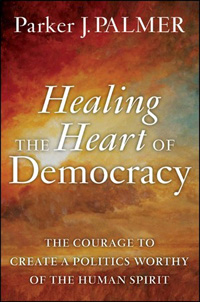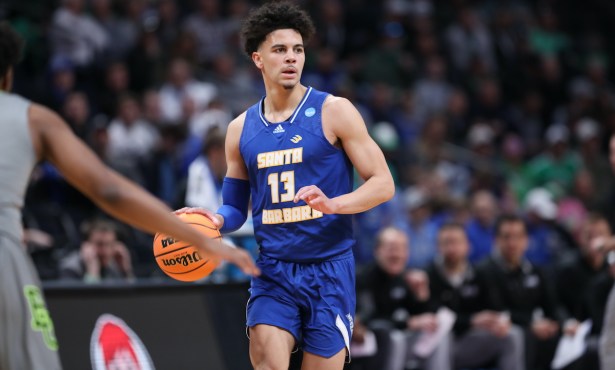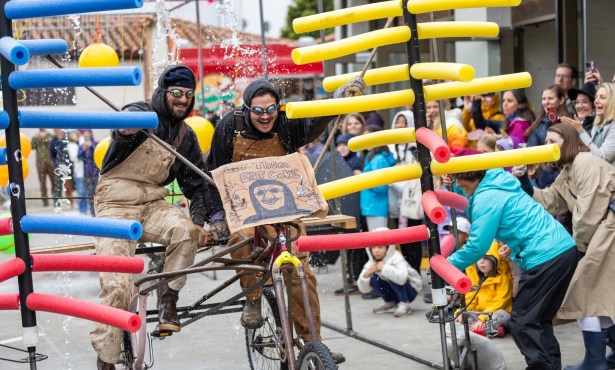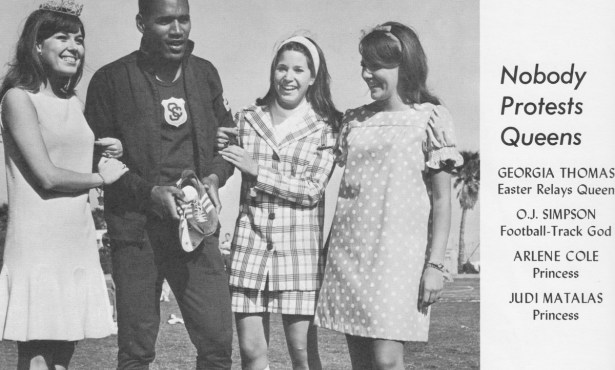Parker Palmer to Speak in S.B.
Bestselling Author and Activist to Discuss His Latest Book
He’s a sociologist, a social activist, and a spiritual seeker. He’s the author of best sellers The Courage to Teach, Let Your Life Speak, and A Hidden Wholeness. He’s the founder of the Center for Courage and Renewal, a leadership-training program for educators, clergy, lawyers, doctors, and philanthropists. Among his fans are activist author Terry Tempest Williams and Congressmember Lois Capps. Now, at age 72, Palmer is turning his attention to U.S. politics. His latest book, Healing the Heart of Democracy, is a call to action aimed at all Americans who care about the health of the nation.
This Wednesday, February 22, the Wisconsin-based thinker will make his first public appearance in Southern California. He’ll be speaking at the Lobero about his book and the ideas behind it. Palmer comes to Santa Barbara courtesy of the local nonprofit The Courage to Lead, founded in 2008 by community leader Ken Saxon, a devotee of Palmer’s who calls him “a wise and articulate analyst of the human condition.”

Despite his strong convictions, Palmer isn’t a political pundit, and he’s not out to sway voters or win support for a particular cause. Instead, he advocates a return of healthy public debate, the importance of regaining our power as “We the People,” and what he calls “change from the inside out”: placing the focus on how we can lives of integrity and social responsibility within our families, schools, churches, neighborhoods, and workplaces.
Last week, I spoke to Palmer about his vision of democracy, and what he thinks it will take to heal America.
What is “the heart of democracy?”
Well, I build the book on a quote from the writer Terry Tempest Williams, who says the human heart is the first home of democracy. I found that a striking notion because most of us think of the first home of democracy as being in a document like the Declaration of Independence or being in a physical place like Washington, D.C., or Capitol Hill, but I think on close examination she’s right. The heart is the place where we wrestle with the questions on which democracy depends: Can we be just? Can we be generous? Tempest Williams uses the word “heart” in a classical sense. It doesn’t just mean the emotions, as we tend to use the word today. The word comes from the Latin cor. It points to the center of the self, the place where all of our capacities—our mind, our intuition, our relational knowledge, our bodily knowledge, our problem-solving capacities—where they all come together.
One reason Tempest Williams’s idea intrigued me is that a very important political thinker in our history came to the same conclusions: Alexis de Tocqueville, who visited America in the 1830s. He came from France, and he wrote Democracy in America, which is arguably still the best book on the subject ever written. He was only 27 years old. One of his most astute observations was that the future of the American democracy would depend on the habits of the heart that people developed and the health of local venues: families, neighborhoods, voluntary communities, classrooms, workplaces, religious communities, and various settings of public life where strangers gather. And he concerned himself with the fact that even in 1835 he was seeing some deterioration in American habits of the heart.
The heart does not inevitably yearn for democracy. The heart yearns for many things, among them, historically, various forms of fascism and totalitarianism. And of course the Holocaust was driven by the shadow side of the human heart, so habits of the heart as he talked about them and the local venues that are formed and deformed—these things are not the frosting on the cake; they’re the fundamental stuff.
I talk about the local venues of our communities as America’s infrastructure. My concern is that we’ve let the infrastructure deteriorate. We all know what happens when we allow deterioration of infrastructure in the physical world: bridges collapse, and roads explode. I think the deterioration of the infrastructure of democracy has been even more overlooked and ignored. For example, schools are no longer so focused on teaching habits of the heart as they once were.
There are so many causes one can champion: education, health-care reform, global warming, the food industry … where do we begin?
Well, I think for me, the starting point of the book is the fact that We the People called this democracy into being, and We the People are the ones who have the power to call it back. I think the beginning point is to realize that We the People have allowed ourselves to be disempowered by having our conflicts exploited for political purposes. We have become enemies of each other. So if you’re on the other side of one of those debates from me, I don’t want to talk to you, and I pretty quickly start demonizing you one way or the other. Partisanship is not the problem; demonizing is the problem. It becomes toxic, and we fragment into small and relatively powerless interest groups—or, far more commonly, we retreat into private life. We don’t want to take the beating, don’t want to speak for fear of retribution.
In American life always there has always been this strong gravitational pull toward the private life. The whole reason this country was founded was so we could feather our nests and retreat into our circles of friends and family groups. But what happens when we retreat in this way is that a great void is created which anti-democratic powers are very happy to rush into. The problem of American democracy today is that it is being driven by powers other than We the People—particularly by big money. I think Bill Moyers in his wonderful way put his finger on it. He says, “The only answer to the power of organized money is the power of organized people.” And I think the Occupy movement gives us at least a taste of what that might look like.
Where do we start? Each of us has issues we care about, and we should keep caring. More fundamentally than that, we have to start by learning how to talk to each other again in our local venues. We’re all in this together. That’s demonstrably the case when you look at an issue like global warming. At the same time, we have to understand that we’re always going to think in terms of us and them. There’s always going to be people with whom I feel more comfortable. But that doesn’t have to mean us versus them. There’s an ancient virtue of hospitality to the stranger in every wisdom tradition I know of. It’s not just about making nice; it’s an acknowledgement that when you shelter a stranger, the benefits for the host exceed those for the guest. It’s about learning how the world looks from another’s point of view.
By 2050, demographers agree, one half or slightly over one half of the U.S. population will be people of color. So for white, middle-class Americans like myself, we have some learning to do. And that learning has to come from dialogue across lines of otherness. It’s the same with the young and the old. I’ll be 73 years old next month. I’ve been very intentional in recent years about working with younger people in their twenties and thirties. I’ve said to them, “At age 72 I’m standing somewhere down the curvature of the earth, can’t see the same horizon you’re looking at. I need your eyes to tell me what’s coming.” And they in turn tell me that they need my experience.
One of the things I say in the book is that I don’t know that we will ever reach a consensus on particular issues, but we must and I think we can reach a new definition of the common good. It’s in the common good to conduct our debates in a way that does not destroy democracy. The issue isn’t simply rancor and bitterness, though that is nasty, but the point is that we disempower ourselves by fragmenting and driving people back into private life. I think the future of American democracy depends on We the People becoming re-empowered.
How do we start the process?
If all you do is vote and send money or emails to your representatives, that’s good, but it’s what I call Citizenship Lite; it’s not enough. At the same time most of us are not going to fly to D.C. and demand an audience with those in power. But anyone in a position of leadership—parents of children, teachers, ministers, doctors, bosses, church leaders—we can help infrastructure rebuilding go on in our own communities. Wendell Barry says it’s a terrible mistake to think big problems always have big answers. He says every big problem has a million little answers, and I like that idea a lot.
I’ve written about five habits of the heart worth cultivating, and I’ve just discussed the first two:
1. We’re all in this together.
2. We need to learn to practice hospitality across lines of otherness.
The last three habits I recommend developing are these:
3. Creative tension holding.
4. Developing a sense of voice and agency.
5. A capacity to create community.
Tell me more about what you mean by creative tension holding.
One of the things we do not often understand or know about the founders of this country is that even though they were white, male landowners who had a definite understanding of We the People that only included some people, they were not as alike as peas in a pod, and because of that they had to create institutions of government that were capable of creative tension holding. If they hadn’t done that, America would not have gotten started. For the founders, conflict and tension were the engine of democracy, not the enemy of democracy. They used tension to do a lot of things. The most important example is that through those institutions of government is that we’ve been able to expand the umbrella of We the People. The most fundamental form of unfaithfulness to the founders is making conflict and tension into the enemy rather than the engine. So I spend a lot of time in the book, as I will in my Santa Barbara talk, on this business of creative tension holding.
Historically, schools have taught this; a liberal education is all about creative tension holding. I mean “liberal” not as a political term but a word that signifies that this is an education suited to a free man or woman; an education that allows citizens of a democracy to entertain contradictory ideas without fear, and to understand the notion of paradox. A liberal education includes literature, music, art: a lot of disciplines where creative tension holding is right at the heart of the enterprise. There is no good art that does not hold tension and take it in some creative direction.
Creative tension holding is a skill you can teach in religious congregations, families, and the workplace. It’s simply about saying, “We have a problem in common; let’s establish a way of working it out together.” When people feel they’ve been heard, they’re much more willing and able to accept a solution that doesn’t fit their idea of a perfect world.
In K through 12 education, all the things that might help young people learn creative tension holding have been blown out the door by high-stakes testing and binary, black-and-white thinking. I don’t think teaching a kid to pass a test is good education. I think teaching a young person to negotiate the complexities of the world and their own lives with some degree of grace is an education. But it’s hard to test for.
How about developing a sense of voice and agency. How do we offer that to our students, or children, or employees?
It’s simply fostering their sense that they have a voice and can do something. That they have different forms of power available to them. Again, if you look at our religious and educational institutions, so many of them turn students or parishioners into rather passive members of an audience, which does not cultivate voice and agency. But we can change that dance. In schools at every level there are a lot of pedagogies that engage students and give them practice at voice and agency. In religious congregations there are ways for the life of a mosque, a synagogue, or a church to be much more interactive and engaged than is sometimes the case.
And then there’s teaching people to create community. How do you do that?
Community can be you and a few friends; it doesn’t have to be big, but it is essential to speaking up and acting in a creative way in society. If you look at the story of Rosa Parks, who is an icon of the kind of citizenship we’re talking about, you quickly see that her sense of voice and agency was nurtured by a community and was amplified by a community when black churches came together to support her action.
Of course, those five habits of the heart taken together are a lot of words, so here are two words that sum it all up: chutzpah and humility. What I mean by that is that we want to cultivate in citizens the chutzpah to believe that as a citizen I have a right to speak and act and call on resources, and also the humility to know I don’t have the whole answer so I need to listen to others as We the People. If I had a magic wand, I’d wave it, and all Americans would have chutzpah and humility.
Back in March, my wife and I went on civil rights pilgrimage on the anniversary of Bloody Sunday. In Birmingham, Montgomery, and Selma, we were relearning the history of a movement that was started by a very small handful of people who didn’t have a magic wand but who multiplied the power of one many, many times over in a way that eventually galvanized America. They had to suffer for it, but John Lewis, who still bears the marks of the beatings he took, is a remarkable example of transforming suffering into something extraordinary and transformational. There isn’t any magic here, but there are things that can be done by small groups of highly marginalized people who have no power other than the power of the human heart.
You mentioned the Occupy movement as an example of what’s possible, but I think there’s also been a lot of disappointment about the way that movement played out, and about the lack of focus of the protests.
I’m going to disagree with those who diss Occup. In my mind, there’s one clear achievement of that movement: Before Occupy, hardly anyone was talking about the huge income and wealth disparity in this country; now lots of people are talking about that. I don’t think many people were thinking about this. It wasn’t popping up in the paper the way it is now. They did a classic thing: They came up with an image: the 99 percent versus the one percent. That is classic social change. And it has made a difference. So I’ll take issue with those who say the movement came and went and was a bunch of crazy young people; I think it’s morphing quietly into other forms.
I draw a lot in my work on the history of great social movements, such as Vaclav Havel and the Velvet Revolution in Czechoslovakia. One man, Havel, a playwright and intellectual, wrote an open letter to the head of the Communist Party basically doing what Rosa Parks did, saying, “I’m not going to take it any more.” He was put under house arrest, but his open letter—which was basically a moral cry from the human heart, a cry for justice and for dignity and all the other things that have been moving the world of late, say, in the Middle East—that open letter led to a vast underground movement that started eating away at this massive thing called Communist domination that had really locked down Czechoslovakia with the standard means of totalitarian control. One of Havel’s mantras was, “It all starts in the heart.” There was a decade or so in there where people could have said, “That was a noble gesture, but it didn’t come to much.” But eventually, his letter changed the course of that region’s history. So I think it’s way too early to call the outcome of the Occupy movement.
But my basic point about the great sweep of human history is that the part we’re taught about in school has to do with the highly visible stuff—the movement of armies, money, national boundaries, goods and services—and that’s only half of human history. The other half is social movements that are sparked and fomented by people who have no armies, no money, no access to institutional power. All they have is the power of the human heart. MLK Jr., Nelson Mandela, Rosa Parks, Vaclav Havel, and all those whose names we don’t know, like in Chile, where the grandmothers called the dictatorial regime to justice by occupying the streets holding placards with pictures of their disappeared children and brought some semblance of justice to the land. We’re talking about matters of conscience. When I look at history, and at our own situation, I don’t have the kind of money that would allow me to speak in Congress with the same clout as Exxon or BP or whoever, but history tells me that I don’t need that kind of power in order to effect change. If it hadn’t been for the movements I’ve named that were begun by people who had been systematically stripped of power, nothing would have changed.
You’ve written about the importance of considering not just ourselves and our particular times but the fate of future generations. Can you elaborate on that idea?
What I think we can all do at any age, but certainly what I’m doing now at age 72, is to look back on the people in American democracy who apparently had my generation on their minds when they made certain decisions, such as the decision to establish and fund public schools. I was the first person in my family to go to college, and I don’t know where I would have been if it were not for many people saying posterity counts as much as we do.
I qualify that by saying that this country has a horrific history of injustice in terms of who they were thinking of when they established these institutions. I think Michelle Alexander’s book The New Jim Crow is one of the most important books of recent years. We may think we’ve transcended slavery as an institution in this country, but the new Jim Crow is represented by the fact that we now have more African Americans in the prison system than we did slaves when the Civil War was fought. There’s a need to keep reviewing justice. Most of those prisoners are not violent criminals; they’ve incarcerated because of drug crimes, and proportionately more of those kinds of crimes are committed by whites than people of color. So obviously something is deeply wrong, and this is enormously destructive to our society at large.
But with that qualification, I have to say as I look back and think about the generations who invested in posterity and gave me the benefit of a public education, to take but one example, and teachers who not only gave me skills and knowledge but who saw in me more than I saw in myself, then I experience a profound movement of the heart to want to pay that forward to subsequent generations, and I don’t see how anyone in this society, especially people like me, can feel otherwise. Yes, we can argue whether the government is doing a good job of holding the state education properly. I think it’s clear to most people that No Child Left Behind has produced a lot of bad outcomes, so we can argue about those things, but I still owe a debt.
Again, the question I keep coming back to is whatever one may think of the particulars of education policy, say, however deeply we disagree on the merits of public education or the Obama admininstration’s unfortunate race to the top, are we willing to hold that public debate and discourse in a way that doesn’t destroy democracy, that doesn’t render the public realm and civic space so toxic that people either flee or make enemies, disempowering us in ways that allow other powers to take over? Are we willing to debate these things in a way that builds democracy up rather than tears it down? We probably won’t reach consensus on the issues, but at the very least, it’s in the common good to debate it in a way that builds up our communities.
4•1•1
Parker Palmer will speak at the Lobero Theatre on Wednesday, February 22 at 7:30 p.m. For tickets, call (805) 963-0761 or visit lobero.com. To learn more about Parker Palmer, visit couragerenewal.org.



